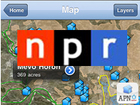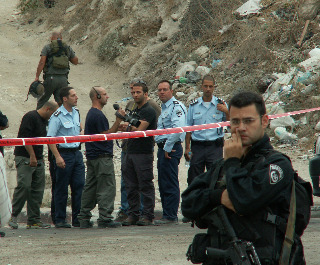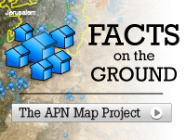Now just to be clear, I have no idea how Sestak's record looks to AIPAC, and I don't really care. But during a week when there has been a lot of discussion over what it means to tell the truth in the Israel advocacy world, Josh's words got my attention. Why? Because while AIPAC may not "rate or endorse candidates," it certainly scores their pro-Israel voting (and letter-signing) record. This is well-known on the Hill and among Hill watchers (and is the root of an often-heard question from Hill staff, "do you know if AIPAC is scoring this?").
September 2010 Archives
Now just to be clear, I have no idea how Sestak's record looks to AIPAC, and I don't really care. But during a week when there has been a lot of discussion over what it means to tell the truth in the Israel advocacy world, Josh's words got my attention. Why? Because while AIPAC may not "rate or endorse candidates," it certainly scores their pro-Israel voting (and letter-signing) record. This is well-known on the Hill and among Hill watchers (and is the root of an often-heard question from Hill staff, "do you know if AIPAC is scoring this?").
1. Bills & Resolutions
2. (Unhelpful) Senate Letter on Peace Process
3. (Partisan) Isakson Letter on Iran
4. Ros-Lehtinen Promises House Resolution on "Jewish State"
5. The settlement freeze ends. What about peace talks?
 release. Media coverage included major news outlets like CNN, U.S. and international newspapers/blogs, technology, business, and activism magazines/blogs/websites, Jewish community newspapers and national blogs, and on Israel Radio and NPR.
release. Media coverage included major news outlets like CNN, U.S. and international newspapers/blogs, technology, business, and activism magazines/blogs/websites, Jewish community newspapers and national blogs, and on Israel Radio and NPR.See the links to these items, starting with the Video Screencast from Kung Fu Jew!
 Last night the Israeli government failed to extend its ban on new settlement construction in the West Bank.
Last night the Israeli government failed to extend its ban on new settlement construction in the West Bank. This is bad news. Israelis and Palestinians are negotiating over the future of the West Bank. Renewed settlement construction sends a dangerous message about Prime Minister Benjamin Netanyahu's commitment to peace talks.
Send a message to President Obama.
Mideast talks fall apart, as Israel lets West Bank settlements begin anew. Peter Beinart writes on how American Jewish groups tie Obama's hands--and work against peace.
We wrote earlier today about the crisis unfolding in Silwan. The latest Jerusalem news - that the Israeli police have withdrawn from the Temple Mount/Haram al Sharif and the barricaded worshipers have left the site - is creating the impression that this crisis is now behind us.
Such a conclusion would be dangerously premature. There are compelling reasons to warn that this crisis may not yet be over:
 Listen to NPR's Morning Edition story focusing on APN's newly launched Map Project and iPhone/iPad app. "Now, powerful mapping technology and extensive data are available for the first time for anyone with an iPhone or computer...Peace Now is offering detailed maps showing why Israeli settlements will also derail a two-state solution." Click here to listen.
Listen to NPR's Morning Edition story focusing on APN's newly launched Map Project and iPhone/iPad app. "Now, powerful mapping technology and extensive data are available for the first time for anyone with an iPhone or computer...Peace Now is offering detailed maps showing why Israeli settlements will also derail a two-state solution." Click here to listen.
Commenting on his suspension, Sobol sounded regretful but stated: "Perhaps the time has come for the controversy over the settlements to come to the surface, and that is my response. And if it costs me this workplace, then I am sorry. But sometimes a person has to go with his truth to the end."
Below is the article from Yedioth Ahronoth (Hebrew print edition) detailing the story.
 Listen to NPR's Morning Edition story focusing on APN's newly launched Map Project and iPhone/iPad app. As they describe it:
Listen to NPR's Morning Edition story focusing on APN's newly launched Map Project and iPhone/iPad app. As they describe it:"Now, powerful mapping technology and extensive data are available for the first time for anyone with an iPhone or computer...Peace Now is offering detailed maps showing why Israeli settlements will also derail a two-state solution."
Go to the NPR website HERE to listen to the 4 minute report.
 (Special to APN from Daniel Seidemann in Jerusalem and Lara Friedman)
(Special to APN from Daniel Seidemann in Jerusalem and Lara Friedman)As most people probably know by now, early this morning (reportedly around 4am local time) an Israeli security guard working for the Silwan settlers shot and killed a Palestinian resident of Silwan and wounded two others, one seriously (Haaretz, Ynet, Maan).
 The founder and executive director of the organization Just Vision speaks about its mission to highlight non-violent efforts to resolve the Israeli-Palestinian Conflict, including its new film "Budrus" to be screened throughout the U.S. in October. The documentary is about the efforts of a man and others from his town and beyond who protest in order to keep their town from being destroyed due to the construction of Israel's security barrier.
The founder and executive director of the organization Just Vision speaks about its mission to highlight non-violent efforts to resolve the Israeli-Palestinian Conflict, including its new film "Budrus" to be screened throughout the U.S. in October. The documentary is about the efforts of a man and others from his town and beyond who protest in order to keep their town from being destroyed due to the construction of Israel's security barrier.
Photos
On Left: An Israeli Settlement seen from the air; On right from top to bottom: Airplane used in the tour; Journalists on the plane; Peace Now's Yariv Oppenheimer addressing the passengers
Americans for Peace now releases app which provides a "comprehensive settlements database, integrated with high-tech mapping technologies."
Americans for Peace Now has released a new interactive mapping application for Apple iPhone and iPad devices which will provide a real-time view of events on the ground in the West Bank, according to a press release by the organization.
Q. PM Binyamin Netanyahu has placed the demand for
Palestinian recognition of Israel as a Jewish state at the center of his
negotiating position. What are the ramifications of this demand for the
future of negotiations?
Q. US peace envoy George Mitchell went straight to Damascus from
the Sharm al-Sheikh and Jerusalem talks of Sept. 14-15 between Israelis
and Palestinians, amidst rumors that a major effort would now be made to
renew Israeli-Syrian peace talks. Why now?
By Natasha Mozgovaya and Haaretz Staff
 Washington, DC - Americans for Peace Now (APN) is today proud to release a revolutionary interactive mapping tool, which will for the first time give anyone, anywhere, a comprehensive real-time view of what is happening on the ground in the West Bank.
Washington, DC - Americans for Peace Now (APN) is today proud to release a revolutionary interactive mapping tool, which will for the first time give anyone, anywhere, a comprehensive real-time view of what is happening on the ground in the West Bank.Facts on the Ground Website
I'm very excited. We've been working on this revolutionary app for close to a year. It is finally ready for you to check out online or on an iPhone or iPad.
Settlements stand in the way of peace. In the short-term, news of their expansion can derail President Barack Obama's efforts to get real peace talks going. In the long-term, unchecked settlement expansion can spell the end for Israel as a Jewish and democratic state.
But that hasn't stopped settler leaders and other talking heads from spouting empty rhetoric about how construction in settlements doesn't really matter. Their tactic is simple: take advantage of the complexity of the situation to obscure construction that undermines peace.
All of that changes today.

Glib talk about settlements harms peace efforts (Part II)
By Lara Friedman Tuesday, September 14, 2010 - 1:39 PM
Part I on the settlement moratorium can be found here
As Israeli and Palestinian negotiators sat down for the second round of peace talks today in Sharm el Sheikh, their meeting was overshadowed by the imminent expiration of the settlement moratorium on September 30th. Many pundits continue to argue that a compromise on the settlement moratorium -- one that permits Israel to pursue some new settlement construction -- is the only thing that can get the parties past this hurdle. Many continue to suggest, too, that a "reasonable" compromise on settlements is easy to define. They are wrong on both counts.
It also seems safe to predict that a corollary to these arguments will soon emerge, to the effect that President Abbas' continued refusal to accept a compromise proves he is weak or, more damning, not serious about making peace. The irony is that this analysis makes as much -- if not more -- sense applied to Prime Minister Netanyahu.
AP: "Israeli FM pushes for new settlement construction"
Questions answered cover: Strategic trends in the Jewish New Year, 5771; The passing of Major General (ret.) Yisrael Tal; Israel Foreign Ministry rejection of a visit by five European foreign ministers; Unusual high-level Israeli visits to Athens and Moscow.
New report indicates an overall of 13,000 previously authorized West Bank housing units, construction sites could be built after the Sept. 26 freeze expiration date.
By Chaim Levinson
Ha'aretz: "MKs, settler leaders fume as PM hints at freeze extension"
Ma'ariv: "Settlers to Netanyahu: Continuation of the Freeze Will Mean an End to Your Term"
ARIEL, West Bank -- When a group of Israeli artists recently refused to perform in the new theater at this large Jewish settlement, local residents reacted with a mixture of hurt and defiance.
APN Backs Israeli Artists who Refuse to Perform in Settlements
Washington, DC - Americans for Peace Now (APN) joins its Israeli sister organization Peace Now (Shalom Achshav) in backing the decision taken collectively by dozens of Israeli performers, authors, artists and scholars not to take part in performances at the new cultural center in Ariel, a settlement located in the heart of the West Bank, or in other West Bank settlements. APN also commends American performers and artists who have expressed support for their Israeli colleagues.
Rightist ZOA head: If PM talks about giving away parts of J'lem, or if freeze partially continues, we and other groups will speak out.
WASHINGTON - Israeli officials are indicating that they anticipate a backlash from the American Jewish Right over the government's overtures to the Palestinians, and are appealing for support from US Jewry.
 APN is pleased to be holding a brunch in honor of Martin Bresler on Sunday, October 3, 2010 at 11:00 am at the Egremont Country Club in Great Barrington, MA.
APN is pleased to be holding a brunch in honor of Martin Bresler on Sunday, October 3, 2010 at 11:00 am at the Egremont Country Club in Great Barrington, MA. View APN's New Year's card to see what it offers with its tea...
View APN's New Year's card to see what it offers with its tea...
(Transcript) STEVE INSKEEP, host:The Israeli-Palestinian peace talks that started last week are quickly running up against a challenge. A deadline is approaching for Israels government to make a decision. And that decision could prompt Palestinians to walk out of the talks.
Washington, DC | September 2, 2010 | 1:00 p.m. EDT
MR. CROWLEY: Good afternoon and welcome to the Department of State in Washington, D.C. Today, we have successfully re-launched direct negotiations between the - among the United States, Israel, and the Palestinian Authority in pursuit of a final agreement, a final settlement and a just peace, two states living side by side. George Mitchell will give a statement and answer a few of your questions, but we still have meetings going on with the parties and will have - he'll have to return upstairs rather rapidly to rejoin the negotiations. But here's Senator Mitchell.
MR. MITCHELL: Good afternoon, ladies and gentlemen. The parties have just concluded the first round of trilateral talks. The meeting lasted about an hour and a half. It began with a plenary session involving the full U.S., Israeli, and Palestinian delegations on the eighth floor of the State Department and then broke to a smaller meeting in the Secretary of State's personal office involving Prime Minister Netanyahu, President Abbas, Secretary Clinton, and myself. Prime Minister Netanyahu and President Abbas then went into a separate meeting for a direct discussion. That meeting is still going on right now.
September 2, 2010
Secretary Clinton's Remarks with Israeli Prime Minister Benjamin Netanyahu and Palestinian Authority President Mahmoud Abbas (video available here)
SECRETARY CLINTON: Good morning and welcome to the State Department here in the Benjamin Franklin Room. I want to thank all of you for joining us today to re-launch negotiations to end the Israeli-Palestinian conflict. I know the decision to sit at this table was not easy. We understand the suspicion and skepticism that so many feel, born out of years of conflict and frustrated hopes. The tragic act of terror on Tuesday and the terrorist shooting yesterday are yet additional reminders of the human costs of this conflict. But by being here today, you each have taken an important step toward freeing your peoples from the shackles of a history we cannot change, and moving toward a future of peace and dignity that only you can create. So, thank you. Thank you for your courage and your commitment.
However, this is not tell the whole story.
The key fact missing from such analysis is this: so much new construction was front-loaded just before the start of the moratorium that if the moratorium is not extended past Sept 26th its impact will have been minimal.
For Immediate Release
September 1, 2010
REMARKS BY PRESIDENT OBAMA, PRESIDENT HOSNI MUBARAK OF EGYPT, HIS MAJESTY KING ABDULLAH OF JORDAN, PRIME MINISTER NETANYAHU OF ISRAEL, AND PRESIDENT MAHMOUD ABBAS OF THE PALESTINIAN AUTHORITY BEFORE WORKING DINNER
East Room
7:05 P.M. EDT
Remarks by the President in the Rose Garden after Bilateral Meetings with Prime Minister Netanyahu of Israel, President Mahmoud Abbas of the Palestinian Authority, His Majesty King Abdullah of Jordan, and President Hosni Mubarak of Egypt
For Immediate Release -- September 1, 2010
First, I'm excited. Today, the leaders of Israel and the Palestinians will sit down to negotiate peace, face to face. And they will do so under the auspices of President Barack Obama, who clearly is committed to achieving peace.
Make no mistake: It's a big deal that Prime Minister Benjamin Netanyahu - head of the most hard-line coalition in Israel's history - is coming to the table to negotiate a two-state peace deal. And it is a big deal that President Mahmoud Abbas is coming to the table with the explicit backing of the entire Arab world.
This is a moment to be savored. It's a sign that our message - that negotiations are the only way to make peace for Israel - has had an impact.
APN is providing up-to-the-minute news and analysis as events unfold. Look here for a list of resources.
September 1, 2010
Oval Office Colonnade
12:24 P.M. EDT
REMARKS BY PRESIDENT OBAMA AND PRIME MINISTER NETANYAHU OF ISRAEL
AFTER BILATERAL MEETING
There are good reasons to be skeptical that these talks will succeed, and the reasons for skepticism are clear: the readiness and ability of both Israeli and Palestinian leaders to deliver their respective sides of a peace agreement is in doubt; President Obama has yet to demonstrate the kind of hands-on, "I-will-not-let-this-fail" engagement that will be necessary for talks to succeed; and of course, spoilers will be out in force, seeking through actions and words to provoke hatred and anger, to undermine trust, and, if possible, to destroy this new peace process.
That said, there are also reasons to be hopeful that these talks can succeed. With most attention these days focused on the reasons for skepticism, we think this is an important time to look seriously at these reasons for hope.
Office of the Press Secretary
August 31, 2010 (10:24 A.M. EDT)
Press Briefing by Special Envoy for Middle East Peace Senator George Mitchell
10:45 am: The President holds a bilateral meeting with Prime Minister Benjamin Netanyahu of Israel in the Oval Office
1:30 pm: The President holds a bilateral meeting with President Mahmoud Abbas of the Palestinian Authority in the Oval Office
2:45 pm: The President holds a bilateral meeting with King Abdullah II of Jordan in the Oval Office
4:00 pm: The President holds a bilateral meeting with President Hosni Mubarak of Egypt in the Oval Office
5:20 pm: The President delivers a statement to the press in the Rose Garden
7:00 pm: The President and visiting leaders deliver statements to the press in the East Room
8:00 pm: The President hosts a working dinner with visiting leaders in the Old Family Dining Room
(click on link for video)